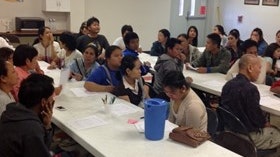Homepage
•
Learning Library
•
Blog
•
How a group of kids helped Burmese refugees find jobs
Expand breadcrumbs
Expand breadcrumbs
- Learning Library
- Blog
- How a group of kids helped Burmese refugees find jobs
- Homepage
- •
- Learning Library
- •
- Blog
- •
- How a group of kids helped Burmese refugees find jobs
How a group of kids helped Burmese refugees find jobs
By Nicole Krueger
January 18, 2014








